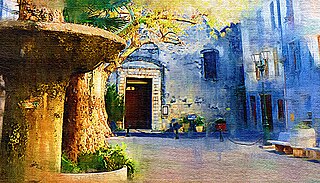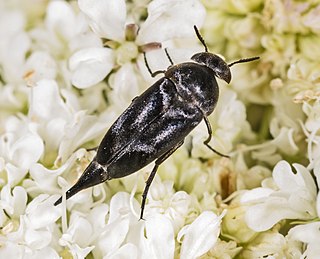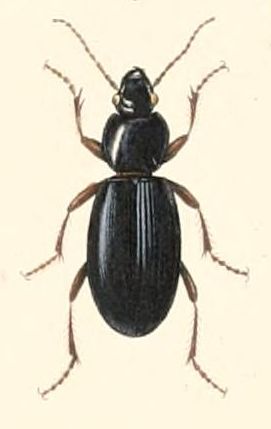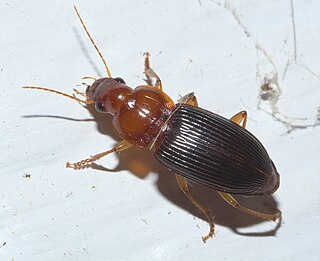Related Research Articles

The soldier beetles (Cantharidae) are relatively soft-bodied, straight-sided beetles. They are cosmopolitan in distribution. One of the first described species has a color pattern reminiscent of the red coats of early British soldiers, hence the common name. They are also known commonly as leatherwings because of their soft elytra.

Soliers is a commune in the Calvados department in the Normandy region in northwestern France.

The Tenebrionoidea are a very large and diverse superfamily of beetles. It generally corresponds to the Heteromera of earlier authors.

Pimelia is a genus of darkling beetles in the subfamily Pimeliinae.

The family Pythidae is a small group of tenebrionoid beetles with no vernacular common name, though recent authors have coined the name dead log bark beetles. There are seven genera, which are largely native to the mid-high latitude regions of the Northern Hemisphere and Australia, with one genus also present in the tropical Americas. The larvae are generally found with decaying vegetation and wood on which they feed, while adults are not associated with the larvae and are generally caught using malaise traps and light traps.

Le Soulié is a commune in the Hérault department in the Occitanie region in southern France.

Solliès-Toucas is a commune in the Var department in the Provence-Alpes-Côte d'Azur region in southeastern France.

Solliès-Ville is a commune in the Var department in the Provence-Alpes-Côte d'Azur region in southeastern France.
Antoine Joseph Jean Solier was a French naturalist, entomologist and plant collector.

Magaly Solier Romero is a Peruvian actress and singer.
Trachelostenus is a genus of beetles belonging to Tenebrionoidea. It is native to the Valdivian forests of Chile, and has at least two species, T. inaequalis (Solier) and T. fascicularis (Philipp). It was historically considered the only member of the family Trachelostenidae, but a 2015 study sunk the genus into the tenebrionid subfamily Tenebrioninae.

Mordella is the type genus of the tumbling flower beetle family (Mordellidae), its subfamily Mordellinae and the tribe Mordellini. It is widely distributed in the Holarctic and adjacent regions. The larvae are primarily dead wood borers.

Carabinae is a subfamily of ground beetles in the family Carabidae. There are about 10 genera and more than 1,400 described species in Carabinae.

Blennidus is a genus of beetles in the family Carabidae, containing the following species:
Solier may refer to:

Charles de Solier, comte de Morette, the son of Aubertin de Solier, comte de Morette (1465–1545), was a French soldier and diplomat as well as a long-serving gentilhomme de la chambre to Francis I. He acted as ambassador to England on a number of occasions from October 1526 to June 1535. Morette was in London in 1534 when Henry VIII was attempting to win French support for his repudiation of Catherine of Aragon, in an alliance against Holy Roman Emperor Charles V. Around this time, his portrait was painted by Hans Holbein the Younger. Holbein had also painted The Ambassadors, which depicted two French envoys, Jean de Dinteville, seigneur de Polisy, and Georges de Selve, Bishop of Lavaur, in 1533. He was succeeded as ambassador by Antoine de Castelnau, Bishop of Tarbes.

Harpalini is a tribe of a diverse group of ground beetles belonging to the subfamily Harpalinae within the broader family Carabidae. The tribe contains more than 1,900 species.
Events from the year 1552 in France

Scytosiphonaceae is a family of brown algae in the order Ectocarpales.

Mariazofia is a genus of ground-dwelling Afrotropical beetles in the family Tenebrionidae. They are among the largest of the darkling beetles. Like other genera within subtribe Molurina, adults of this genus engage in a behavior known as "substrate tapping", a form of sexual communication in which they produce vibrations by tapping their abdomen rhythmically on the ground to attract mates. Their common name, "tok-tok beetle" or "toktokkie beetle", is based on this behavior.
References
- ↑ "Plagiotelum Solier, 1849". Catalogue of Life. Retrieved 2023-04-08.